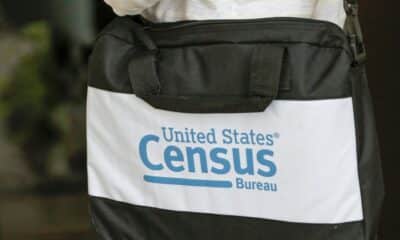Mississippi Today
Mississippi Today’s Anna Wolfe honored by Time magazine

Mississippi Today poverty reporter Anna Wolfe has been named to the 2024 TIME100 Next list.
According to Time, the list aims to recognize “rising leaders in health, climate, business, sports, and more—and by doing so, not just show the stories that are capturing headlines in 2024, but also introduce you to the people who we believe will play an important role in leading the future.”
A majority of this year’s honorees are people of color; more than half are women.
“Mississippians have come to know and respect Anna as a champion for people whose voices are overlooked or ignored, and as someone who is not afraid to speak truth to power,” says Adam Ganuchaeu, editor-in-chief at Mississippi Today. “It’s awesome for her to get even more national recognition for just that. This is so deserving a recognition for a true Mississippi legend, and all of us are so lucky to have her here.”
Wolfe won the 2023 Pulitzer Prize for Local Reporting for her remarkable investigation “The Backchannel,” which uncovered the depth of the sprawling $77 million welfare scandal, the largest embezzlement of federal funds in the state’s history.
In her profile of Wolfe for 2024 TIME100 Next, PBS senior correspondent Judy Woodruff writes, “at a time when journalism is struggling to survive, Anna reminds us why it matters.”
This article first appeared on Mississippi Today and is republished here under a Creative Commons license.![]()
Mississippi Today
A second Mississippi victim is identified in New Orleans terror attack

NEW ORLEANS (AP) — An 18-year-old girl dreaming of becoming a nurse, a single mother, a father of two and a former Princeton football star suffered fatal injuries when the driver of a white pickup truck sped down Bourbon Street, packed with holiday revelers.
Officials have not yet released the names of the 14 people killed in the New Orleans New Year’s Day truck attack, but their families and friends have started sharing their stories. New Orleans Coroner Dr. Dwight McKenna said in a statement late Wednesday that they will release the names of the dead once autopsies are complete and they’ve talked with the next of kin. About 30 people were injured.
Matthew Tenedorio
The parents of Matthew Tenedorio, a native of Pearl River County, Mississippi, told NBC News that their son was one of the people killed in the attack.
“He was 25 years old. He was just starting life. He had the job of his dreams,” Cathy Tenedorio said. “It’s just very sad.”
A GoFundMe page created by a cousin says he was an audiovisual technician at the Superdome.
“He was a wonderful kid,” Louis Tenedorio added. “He loved people. He loved animals. He always had a smile. So many friends. He had so many friends.”
Cathy Tenedorio said she had spent New Year’s Eve with Matthew and another one of her sons.
“We had dinner and we did fireworks outside, and just laughing and hugging each other and telling each other we loved each other,” she said. She added that they had tried to dissuade him from going into the city.
“They don’t think about risk,” she said.
Mississippi Gov. Tate Reeves tweeted his condolences to Tenedorio’s family on Thursday.
Nikyra Dedeaux
Zion Parsons of Gulfport, Mississippi, had been celebrating New Year’s Eve at his first night on Bourbon Street when a vehicle appeared and plowed into his friend, 18-year-old Nikyra Dedeaux, who he said had dreamed of becoming a nurse.
“A truck hit the corner and comes barreling through throwing people like in a movie scene, throwing people into the air,” Parsons, 18, told The Associated Press. “It hit her and flung her like at least 30 feet and I was just lucky to be alive.”
READ MORE: Mississippi teen among those killed in suspected terrorist attack in New Orleans
As the crowd scattered in the chaos he ran through a gruesome aftermath of bleeding and maimed victims, hearing gunshots and explosive sounds.
“Bodies, bodies all up and down the street, everybody screaming and hollering” Parsons said. “People crying on the floor, like brain matter all over the ground. It was just insane, like the closest thing to a war zone that I’ve ever seen.”
Dedeaux was a responsible daughter — shorter than all her siblings but the one who helped take care of everyone, Parsons said. Dedeaux had a job at a hospital and was set to start college and begin working towards her goal of becoming a registered nurse.
“She had her mindset — she didn’t have everything figured out but she had the plan laid down,” Parsons said.
Gov. Reeves tweeted his condolences to Dedeaux’s family on Thursday.
Reggie Hunter
A 37-year-old father of two from Baton Rouge, Reggie Hunter had just left work and headed to celebrate New Year’s with a cousin when the attack happened, his first cousin Shirell Jackson told Nola.com.
Hunter died and his cousin was injured, Jackson said.
Tiger Bech
A former high school and college football player from Louisiana was among those who died, according to an education official.
Tiger Bech, 27, died late Wednesday morning at a New Orleans hospital, according to local media outlets citing Kim Broussard, the athletic director at St. Thomas More Catholic High School in Lafayette. Bech attended the high school, where he played wide receiver, quarterback, punt returner and defensive back, NOLA.com reported.
Bech played football at Princeton University before graduating in 2021. Most recently he was working as an investment trader at a New York brokerage firm.
Marty Cannon, STM principal and former Bech coach, said he was an incredibly talented football player, but also charismatic and intelligent. After graduating from Princeton and working in the city, he regularly returned to visit his tight-knit family, close friends and people at the school. He was home over Christmas.
“We live in a relatively small community here where not a lot of people leave but many do,” Cannon said. “I’m not surprised at all that Tiger could take off from south Louisiana and go off and get an amazing education at a place like Princeton and then lock himself into a community up there and just flourish. He’s that kind of guy.”
Princeton football coach Bob Surace said Wednesday that he had been texting with Bech’s father, sharing memories of the player, who was a school kick returner and receiver from 2017 to 2019. He earned All-Ivy League honors as a returner.
“He might be the first Tiger to ever play for us, and that nickname kind of described him as a competitor,” Surace told ESPN. The school’s nickname is the Tigers. “He was somebody that somehow, like in the key moments, just excelled and was full of energy, full of life.”
Bech has been working at Seaport Global, where company spokesperson Lisa Lieberman could not confirm his death. But she told The Associated Press that “he was extremely well regarded by everybody who knew him.”
Bech’s younger brother, Jack, is a top wide receiver at Texas Christian University.
In a response to a KLFY-TV report posted on X about Tiger Bech’s death, a post from an account for a Jack Bech on the social media site said: “Love you always brother ! You inspired me everyday now you get to be with me in every moment. I got this family T, don’t worry. This is for us.”
Nicole Perez
Nicole Perez was a single mother to a 4-year-old son working hard to make life better for her family when she was killed, according to her employer.
Perez, who was in her late 20s, was recently promoted to manager at Kimmy’s Deli in Metairie, Louisiana, and “was really excited about it,” deli owner Kimberly Usher said in a phone interview with AP. Usher confirmed Perez’s death through her sister, who also works for her.
Usher said Perez would walk in the morning to the deli, which opened at breakfast time, and would ask lots of questions about the business side of the operations. She also was permitted to bring her son, Melo, to work, where during breaks she taught him basic learning skills.
“She was a really good mom,” said Usher, who started a GoFundMe account to cover Perez’s burial costs and to help with expenses for her son that “he will need to transition into a new living situation,” the donation request says.
Injured in the Attack
Heaven Sensky-Kirsch said her father, Jeremi Sensky, endured 10 hours of surgery for injuries that included two broken legs. He was taken off a ventilator Thursday.
Jeremi Sensky was ejected from the wheelchair he has used since a 1999 car accident and had bruises to his face and head, Sensky-Kirsch said in a phone interview from a hospital intensive care unit.
“He’s talking right now,” Sensky-Kirsch said late Thursday morning.
Sensky, 51, who works in the family’s tree service business, had driven from his home in Canonsburg, Pennsylvania, to New Orleans to celebrate the holiday.
He and his wife, his daughter, his son-in-law and two friends stopped for a few days in Nashville before arriving in New Orleans, a place they just always wanted to visit.
Before the attack, Sensky and the two friends had been having pizza, his daughter said. Sensky left them to return to his hotel on Canal Street because he felt cold, she said.
Sensky-Kirsch said others could see the attacker coming and were able to run out of the way, but her father “was stuck on the road.” His wheelchair can been seen in some images lodged against a crane.
When he didn’t return to the hotel, they went to look for him, she said.
“We thought he was dead,” Sensky-Kirsch said. “We can’t believe he’s alive.”
Also injured:
— University of Georgia President Jere W. Morehead said on “X” that a student was critically injured in the attack and is receiving medical treatment. He did not name the student.
— The Israeli Ministry of Foreign Affairs said on “X” that two Israeli citizens were injured in the attack.
— University of Mississippi Chancellor Glenn Boyce said Thursday that one of the university’s students was critically injured in New Orleans. Boyce did not identify the student.
Jack Brook in New Orleans, Gary Robertson in Raleigh, North Carolina, Emily Wagster Pettus in Jackson, Mississippi, Travis Loller in Nashville and Martha Bellisle in Seattle contributed to this report.
This article first appeared on Mississippi Today and is republished here under a Creative Commons license.![]()
Mississippi Today
On this day in 1903


Jan. 2, 1903

President Theodore Roosevelt shut down the post office in Indianola, Mississippi, to take a stand against terror.
In 1891, then-President Benjamin Harrison had appointed educator Minnie Cox, a Mississippi property owner active in the Republican Party, as one of a handful of Black female postmasters. She served her community so well that she installed a telephone at her own expense so that customers could call to see if they had mail.
But then Reconstruction ended, accompanied by a continuing rise in white supremacy and violence.
In 1902, James K. Vardaman, who spewed racist rhetoric while successfully running for governor, insulted both Cox and white citizens for “tolerating” her. He used Cox’s position as proof Black Americans had too much power, demanding that Roosevelt remove her, but the President refused.
When she tried to quit, he refused her resignation and rerouted the mail to nearby Greenville. Days later, she and her family fled from the mob violence, which had already stolen the lives of two Black postmasters in South Carolina and Georgia.
Cox’s saga became a national story on race, and Roosevelt shut down the post office until local citizens would accept Cox as postmaster. That never happened, and when her term expired, Roosevelt appointed her friend, William Martin, in her place in 1904.
Cox and her husband, Wayne, the city’s first Black alderman, finally returned and founded the Delta Penny Savings Bank, the largest Black-owned bank in Mississippi. During those days, the bank sold hundreds of homes to Black citizens, and some of the same white citizens who called for Cox’s resignation now put money in her bank.
Her story echoed the difficulties of many Black Americans, wrestling “with racism and the erosion of democratic rights at every level of government” that led to boycotts and “Buy Black” movements.
She died in 1933, and the Indianola Post Office now bears her name. Mississippi author Steve Yarbrough fictionalized her life in his 2001 novel Visible Spirits.
This article first appeared on Mississippi Today and is republished here under a Creative Commons license.![]()
Mississippi Today
Medicaid expansion: What are its chances in 2025?


Arguably the biggest issue of the 2024 legislative session, Medicaid expansion is likely to come up again next year. But did the historic 2024 session create the momentum needed for it to cross the finish line in 2025, or was it merely a one-off?
The two most influential lawmakers for this issue in the Senate, Lt. Gov. Delbert Hosemann, who oversees the Senate, and Senate Medicaid Chair Kevin Blackwell, both told Mississippi Today they would not consider an expansion plan that didn’t include a work requirement.
Hosemann, who said he was disappointed with the way expansion died last year, confirmed in an emailed statement that he would push for an expansion bill next session as long as it had a work requirement in it. Blackwell declined to comment whether he would push the issue next year.
A work requirement is more likely to be approved by the federal government this year than last, since President-elect Donald Trump will be in office and approved work requirements in his last term.
Still, the Trump administration only ever approved work requirements in states that had expansion – as a means of limiting it – and never in states seeking to expand Medicaid for the first time. That means the Senate is banking on the president making an unprecedented move for Mississippi.
Including a work requirement is a political tactic meant to make expansion more palatable to a Republican majority Legislature led by a governor who has been vehemently opposed to expansion for years, derisively calling it “Obamacare” and “welfare” on social media.
The bureaucracy of requiring monthly or semi-annual proof of employment ends up being another stressor on low-income people already facing a slew of socioeconomic barriers – as well as a stressor on the state Medicaid system, some experts say.
Currently, Georgia is the only expanded state with a work requirement, and it remains in litigation with the federal government over the issue. The plan has only covered 4,300 people – despite lawmakers predicting 345,000 people would be eligible – and cost taxpayers $26 million as of last March. More than 90% of that went toward administrative costs.
“Georgia’s plan has proven to be very profitable for large companies like Deloitte (the primary consultant for Georgia’s project) but has provided health care to almost no one who needs it,” said Joan Alker, Medicaid expert and executive director of Georgetown University’s Center for Children and Families. “It’s been a terrible waste of taxpayer dollars so far.”
Meanwhile, Hosemann and Blackwell’s counterparts in the House chose not to speak to Mississippi Today on the details of the issue ahead of the session, despite being the main drivers of last year’s expansion bill – the first expansion bill authored by Republicans in the history of the Mississippi Legislature, and which garnered more support than any other expansion bill in the last decade.
Speaker of the House Jason White did not respond to Mississippi Today’s questions about his plans for the session.
White told business leaders at the Mississippi Economic Council’s annual Hobnob event that he would make Medicaid expansion a 2025 legislative priority.
“We trust our elected officials and state agencies to use federal dollars responsibly to invest in critical infrastructure, promote education and workforce training and maintain a balanced regulatory framework that all promote economic development,” White said. “Let’s give our hospitals and health care experts the same opportunity, so that hardworking, low-income Mississippians will benefit.”
House Medicaid Chairwoman Missy McGee told Mississippi Today that it will be a priority for the House Medicaid Committee.
The 2024 House expansion bill included a provision that if federal authorities did not approve the waiver necessary to allow a Mississippi work requirement by a certain deadline, Medicaid would still be fully expanded to people up to 138% of the federal poverty level – about $20,000 for an individual or $43,000 for a family of four. Ultimately, the Senate scratched that provision in conference, and also lowered the income threshold to 99% of the federal poverty level – about $15,000 for an individual or $31,000 for a family of four. The Senate’s plan isn’t considered traditional expansion and wouldn’t qualify for the increased federal match that makes expansion a prudent economic policy for states.
Since the Affordable Care Act made it possible in 2014, states have had the option to expand Medicaid to cover the working poor. Mississippi is one of only 10 states not to do so.
Tens of thousands of working Mississippians go without health coverage each year, making too little to afford the high deductibles on the cheapest marketplace insurance plan but too much to qualify for Medicaid under the current stipulations.
Medicaid eligibility varies from state to state, and Mississippi has one of the strictest income requirements in the nation. Childless adults don’t qualify, and parents must make less than 28% of the federal poverty level, a mere $7,000 annually for a family of three, to qualify. More times than not, that means that working a full-time job counts against an individual – despite anti-expansion critics arguing that Medicaid should only apply to those who work.
Expanding Medicaid would cover adults – including those without children – who make up to 138% of the federal poverty level.
But it would also alleviate an enormous burden that Mississippi hospitals currently shoulder: uncompensated care costs.
Without health insurance, many Mississippians are forced to let their health conditions deteriorate. That, in conjunction with the fact that the emergency room is the only place health care providers can’t turn patients away for not having money, means that some Mississippians use the emergency room as their only source of primary care.
The emergency room is also the most expensive place to receive care. When patients can’t pay, hospitals pick up the slack covering their care, and the practice – called uncompensated care – costs hospitals millions.
That’s why Mississippi Hospital Association’s CEO, Richard Roberson, is again asking the Legislature to consider expansion.
“The upside for hospitals could be several hundred million dollars,” he said. “Right now, the hospitals continue to see the patients that don’t have any form of insurance, which is financially harmful for hospitals because they’re having to provide that care for which they’re not being paid. But probably the bigger and most important part of that is you’re having people that are showing up in the hospitals for what really amounts to primary care services – and that’s not what hospitals are for.”
Without expansion, he said, it’s “very possible” more rural hospitals will be forced to shut down in the coming years.
Right now, they’re being kept afloat by enhanced Medicaid payments Gov. Tate Reeves passed in the eleventh-hour of his heated 2023 reelection campaign. But Roberson said there’s no guarantee those payments will continue, which makes it hard for hospitals to plan services and staff.
“We don’t want to rely on a program that’s a one-year program, because that enhanced payment, we’ve got to ask for it every single year,” he said. “And so, as hospitals try to plan for the services they’re going to provide, or as they’re trying to recruit physicians and other staff members, you know you’ve got this for one year … but there are no guarantees.”
Roberson says he’s hopeful going into 2025, given how far expansion got last session.
“I’m more hopeful than I have been, because we now know what a starting place is – for both the Senate and the House. We now know from that conference report what a meeting of the minds was seven months ago. So, that makes me hopeful that whatever concerns still remain, it’s a shorter path to get to those. We’re not starting from scratch.”
But because many Republicans still oppose expansion, any expansion bill in 2025 will likely need the help of the minority party to achieve a veto-proof majority. Last year, Democrats came under fire for blocking a Medicaid expansion compromise in the final days of the session – despite pushing expansion bills for years to no avail – because they felt that the compromise Republican leaders reached wasn’t expansion at all.
Getting both chambers and both parties to agree could prove difficult again this year.
This article first appeared on Mississippi Today and is republished here under a Creative Commons license.![]()
-

 News from the South - Alabama News Feed6 days ago
News from the South - Alabama News Feed6 days agoSevere Storms Possible Saturday Evening through Early Sunday: Friday Evening Forecast 12/27/2024
-

 News from the South - Texas News Feed6 days ago
News from the South - Texas News Feed6 days agoPlayers remember coach who died trying to rescue daughter
-

 Local News Video6 days ago
Local News Video6 days agoFIRST ALERT: Storm update, Alert Day coming Saturday (12/27/2024)
-

 News from the South - Texas News Feed6 days ago
News from the South - Texas News Feed6 days ago‘His shoe game is on point’: Alamo Bowl head coaches share compliments at Friday’s kickoff luncheon
-

 News from the South - Florida News Feed2 days ago
News from the South - Florida News Feed2 days ago2025 opens with strong punch of cold air slated to send Florida into a freeze. Here’s what to expect
-

 News from the South - Tennessee News Feed6 days ago
News from the South - Tennessee News Feed6 days agoWhich state sent the most people to Tennessee in 2023?
-

 News from the South - Louisiana News Feed6 days ago
News from the South - Louisiana News Feed6 days agoBlue Cross must pay over $400M for breast cancer care, judge rules in Louisiana
-

 News from the South - Texas News Feed6 days ago
News from the South - Texas News Feed6 days agoAir Force veteran overcomes physical, emotional trauma to become a top paraclimber





























